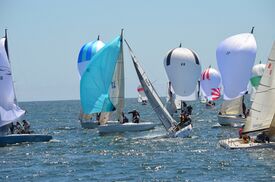Engineering:Moore 24
 | |
 | |
| Development | |
|---|---|
| Designer | George Olson and Ron Moore |
| Location | United States |
| Year | 1972 |
| No. built | 158 (2021) |
| Builder(s) | Moore Sailboats |
| Role | Racer |
| Boat | |
| Boat weight | 2,050 lb (930 kg) |
| Draft | 4.08 ft (1.24 m) |
| Hull | |
| Type | monohull |
| Construction | fiberglass |
| LOA | 23.75 ft (7.24 m) |
| LWL | 21.75 ft (6.63 m) |
| Beam | 7.17 ft (2.19 m) |
| Engine type | outboard motor |
| Hull appendages | |
| Keel/board type | fin keel |
| Ballast | 1,000 lb (454 kg) |
| Rudder(s) | internally-mounted spade-type rudder |
| Rig | |
| Rig type | Bermuda rig |
| I (foretriangle height) | 26.25 ft (8.00 m) |
| J (foretriangle base) | 9.75 ft (2.97 m) |
| P (mainsail luff) | 25.00 ft (7.62 m) |
| E (mainsail foot) | 9.50 ft (2.90 m) |
| Sails | |
| Sailplan | fractional rigged sloop |
| Mainsail area | 118.75 sq ft (11.032 m2) |
| Jib/genoa area | 127.97 sq ft (11.889 m2) |
| Total sail area | 246.72 sq ft (22.921 m2) |
| Racing | |
| Class association | MORC |
| PHRF | 150-156 |
The Moore 24 is an American trailerable sailboat that was designed by George Olson and Ron Moore as a racer and first built in 1972.[1][2][3]
Production
The design is built by Moore Sailboats in the United States. The company built 156 boats between 1972 and 1988, with two more in more recent years, for a total of 158. The design remains in production.[1][3][4][5]
Design
The Moore 24 is a development of Grendel, a prototype sailboat that was intended for a Transpacific Yacht Race for boats under 30 ft (9.1 m) in length. That race was never held, but Grendel went on to win the 1970 Midget Ocean Racing Class (MORC) championships. Grendel had a beam of under 6 ft (1.8 m), but the production boat was given a wider beam of 7.17 ft (2.19 m). The Moore 24 also received a raised deck to increase headroom below, a relocated keel and a new sail plan. Development has continued though the production period of the boat and production boats in 2021 were all flush-decked, with open transoms, while remaining class-legal.[3]
The Moore 24 is a racing keelboat, built predominantly of fiberglass, with wood trim. It has a fractional sloop rig, a raked stem, a reverse transom, an internally mounted spade-type rudder controlled by a tiller and a fixed fin keel. It displaces 2,050 lb (930 kg) and carries 1,000 lb (454 kg) of ballast, giving it a high ballast-displacement of 48.78%.[1][3]
The boat has a draft of 4.08 ft (1.24 m) with the standard keel. It is normally fitted with a small 2 to 4 hp (1 to 3 kW) outboard motor for docking and maneuvering. It has sleeping accommodation for two people. Cabin headroom is 42 in (107 cm).[1][3]
The design has a PHRF racing average handicap of 156 according to The Sailor's Book of Small Cruising Sailboats and 150 according to the Yacht Racing Association of San Francisco Bay. It has a hull speed of 6.2 kn (11.5 km/h).[3][6]
In a 2010 review Steve Henkel wrote, "best features: She's fast in heavy air; the high (50%) B/D ratio helps to keep the Moore 24 on her feet. Worst features: Due to her light weight and cramped cabin space, almost no one would want to buy this design as a cruising boat."[3]
Operational history
The boat is supported by an active class club that organizes racing events, the Moore 24 National Association.[7]
Serial circumnavigator Webb Chiles sailed his Moore 24, Gannet, solo around the world from 2014–2019, departing and arriving San Diego, California.[8]
In 2016 the Moore 24 Mas! won the Pacific Cup overall, double handed, crewed by Mark English and Ian Rogers. The two set a new course record for the Moore 24 of 10 days 14 hours and 30 minutes[9] with a 240 mile best 24 hour run.[10]
References
- ↑ 1.0 1.1 1.2 1.3 McArthur, Bruce (2020). "Moore 24 sailboat". sailboatdata.com. https://sailboatdata.com/sailboat/moore-24.
- ↑ McArthur, Bruce (2021). "George Olson 1946 - 2015". sailboatdata.com. https://sailboatdata.com/designer/olson-george.
- ↑ 3.0 3.1 3.2 3.3 3.4 3.5 3.6 Henkel, Steve: The Sailor's Book of Small Cruising Sailboats, page 261. International Marine/McGraw-Hill, 2010. ISBN 978-0-07-163652-0
- ↑ McArthur, Bruce (2021). "Moore Sailboats". sailboatdata.com. https://sailboatdata.com/builder/moore-sailboats.
- ↑ Moore Sailboats. "Moore 24". mooresailboats.com. https://www.mooresailboats.com/moore-24/.
- ↑ "No Cal PHRF". http://yra.org/wp-content/uploads/2022/03/Baserate_032822.pdf.
- ↑ McArthur, Bruce (2021). "Moore 24 Racing (Class Assoc.)". sailboatdata.com. https://sailboatdata.com/association/moore-24-racing-class-assoc.
- ↑ Chiles, Webb (1 June 2020). "Solo Pacific sailing: The adventures of Webb Chiles and his Moore 24 Gannet". yachtingworld.com. https://www.yachtingworld.com/voyages/solo-pacific-sailing-webb-chiles-moore-24-gannet-126337.
- ↑ "Moore 24 sweeps Pacific cup". 23 July 2016. https://www.sailingscuttlebutt.com/2016/07/22/moore-24-sweeps-pacific-cup/.
- ↑ "240 mile date Mas". https://yb.tl/paccup2016.
External links
 |
